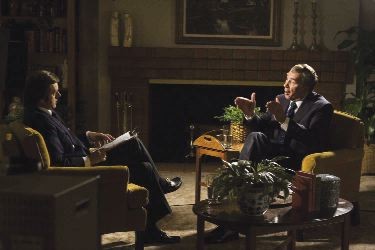Frost/Nixon

Working at the top of his game as both a filmmaker and an actor’s director, Ron Howard has converted one of the most intriguing media events of the late 1970s—David Frost’s TV interviews with Richard Nixon three years after Nixon resigned as president—into memorable drama.
He’s working from a first-rate screenplay by Peter Morgan, an adaptation of Morgan’s own play—a success in London’s West End and on Broadway with the same actors, Frank Langella and Michael Sheen, in the roles of Nixon and Frost, respectively. The play was an intelligent piece of work, but riveting mostly for Langella’s dynamic, witty performance.
For the screen, Morgan (whose specialty is constructing scenarios around real-life personalities, like Queen Eliza beth II and Tony Blair in The Queen and Idi Amin in The Last King of Scotland) has expanded the material and restructured it to flesh out the characters on the periphery. These include Bob Zelnick (Oliver Platt), newspaper editor turned bureau chief at ABC News; John Birt (Matthew Macfadyen), Frost’s close friend and producer; Jim Reston Jr. (Sam Rockwell), a writer and political science professor obsessed with Nixon’s abuses of power, whom Zelnick brings onto Frost’s team; Frost’s girlfriend, Caroline Cushing (Rebecca Hall); and especially Nixon’s loyal chief of staff, Jack Brennan (Kevin Bacon).
In the stage version Brennan’s military gruffness and unassailable conservativism—he pronounces Frost’s laceless Italian loafers “effeminate”—were caricatured. But Bacon, a superlative character actor, gets under Brennan’s skin rather than commenting on him. The other supporting performers are also resourceful, sharp and funny, among them Toby Jones, holding his head forward like a turtle and turning his mouth down in a permanent resolute frown as Nixon’s agent, the notorious Swifty Lazar. And Morgan has evened out their roles. In the play Reston, whose dream is for Nixon to get the criminal trial that Gerald Ford’s pardon preempted, provides the narration, and his perspective distorts the story. In the movie, almost all of the secondary characters address the camera, so everyone gets to contribute to the recounting of the tale.
This fine-tuning has the additional effect of framing and balancing the two central actors. Though they share the title, in the play version the foxy, self-aggrandizing Nixon, whose sentimental digressions keep Frost at bay for the first three (of four) sessions, is so much more colorful than Frost that, especially with Langella in the grandstanding Nixon role, it is tough to keep your attention on Sheen. But Sheen (who played Tony Blair opposite Helen Mirren in The Queen) is a superb and subtle camera actor, and Howard underscores his skillfulness at getting the tiny wrinkles of anxiety under Frost’s million-dollar smile. Frost sees the Nixon interviews as a way of proving that he isn’t just a master of puffery, and he risks his career to secure them; he even raises the money himself. His struggle to show he’s capable of piercing Nixon’s armor and getting him to admit to wrongdoing is as poignant as Nixon’s struggle to keep from losing face once more on national television.
Langella’s impersonation of Nixon is inspired, but of course his performance is far more than mere impersonation. He captures Nixon’s complexly wounded face as well as the various facets of his personality—the used-car-salesman side (more effective than many may like to acknowledge); the sappy, homiletic side, and finally, in the film’s mesmerizing final half hour, the teetering, paranoid side, which is strangely mixed with a majestic arrogance. And when Frost eventually gets Nixon to confess that he let down the American people, Langella achieves what Anthony Hopkins couldn’t in the three hours of Oliver Stone’s Nixon: he transforms Nixon into a tragic figure.
At the end Reston’s rage at the man who betrayed America isn’t a sufficient response to Nixon; the movie goes beyond it. And it uses Frost’s TV savvy to do so. The irony in the story is that, shallow and undistinguished as he may be, this back-slapping British media personality has an instinctual comprehension of what the camera can expose that makes the final episode in his interrogation of Nixon unforgettable.





